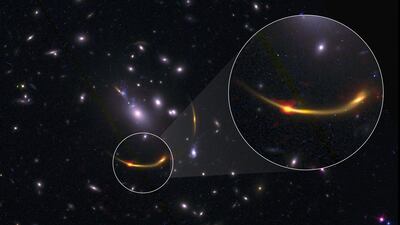Scientists have solved the mystery of why some of the universe’s oldest massive galaxies go quiet early in their formation.
These galaxies, which formed in the 3 billion years after the Big Bang, should have contained large amounts of cold hydrogen gas, the fuel required to make stars.
But researchers observing the early universe with the Atacama Large Millimetre/Submillimetre Array, known as Alma, and the Hubble Space Telescope have found half a dozen early huge galaxies that ran out of fuel.
“The most massive galaxies in the universe lived fast and furious, creating their stars in a remarkably short amount of time," said Kate Whitaker, professor of astronomy at the University of Massachusetts Amherst, in the US.
“Gas, the fuel of star formation, should be plentiful at these early times in the universe. We originally believed that these quenched galaxies hit the brakes just a few billion years after the Big Bang.
“In our new research, we’ve concluded that early galaxies didn’t actually put the brakes on, but rather they were running on empty.”
Star formation is a key way in which galaxies grow, and they are said to have become inactive when they stop forming stars.
“There was copious cold gas in the early universe, so these galaxies, from 12 billion years ago, should have plenty left in the fuel tank,” Prof Whitaker said.
Instead, researchers found only traces of cold gas at the centre of each galaxy.
This suggests that within the first few billion years of the universe’s existence, these galaxies either burnt through their energy supplies or ejected them.
It further indicates something may be physically blocking each galaxy’s replenishment of cold gas, researchers suggest.
They are not sure why this happens but possible explanations could be that the primary gas supply fuelling the galaxy is cut off, or perhaps a supermassive black hole is injecting energy that keeps the gas in the galaxy hot.
The galaxies are so far away that we are only just now seeing the light they emitted 10 billion to 12 billion years ago, when the universe was in its infancy.
The findings are published in Nature.


